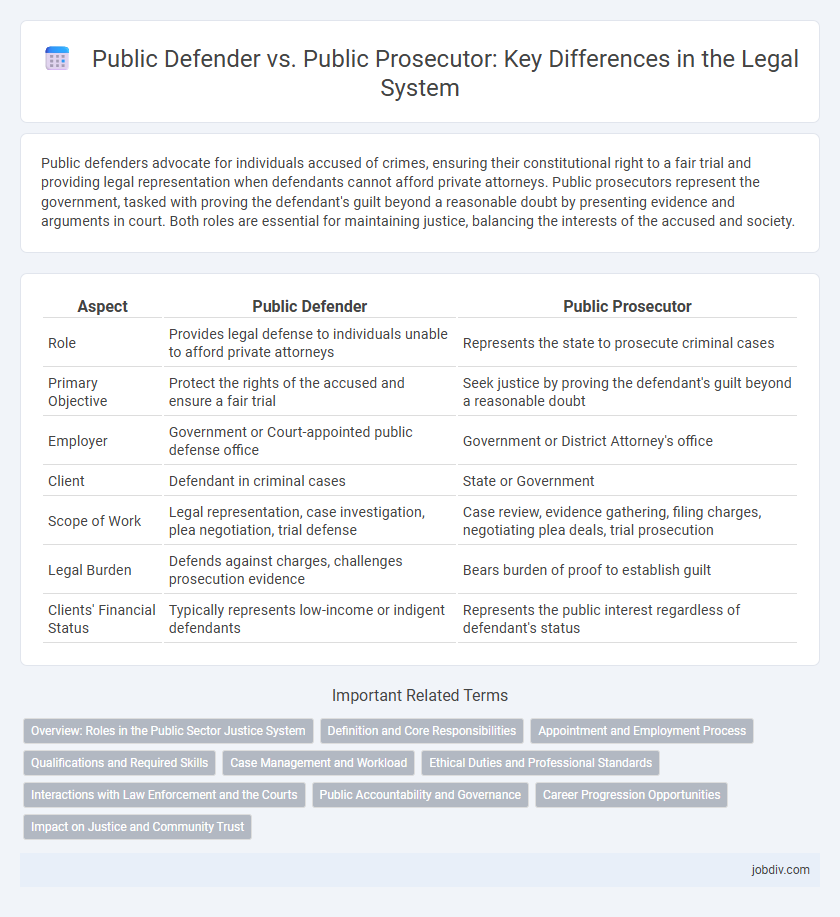Public defenders advocate for individuals accused of crimes, ensuring their constitutional right to a fair trial and providing legal representation when defendants cannot afford private attorneys. Public prosecutors represent the government, tasked with proving the defendant's guilt beyond a reasonable doubt by presenting evidence and arguments in court. Both roles are essential for maintaining justice, balancing the interests of the accused and society.
Table of Comparison
| Aspect | Public Defender | Public Prosecutor |
|---|---|---|
| Role | Provides legal defense to individuals unable to afford private attorneys | Represents the state to prosecute criminal cases |
| Primary Objective | Protect the rights of the accused and ensure a fair trial | Seek justice by proving the defendant's guilt beyond a reasonable doubt |
| Employer | Government or Court-appointed public defense office | Government or District Attorney's office |
| Client | Defendant in criminal cases | State or Government |
| Scope of Work | Legal representation, case investigation, plea negotiation, trial defense | Case review, evidence gathering, filing charges, negotiating plea deals, trial prosecution |
| Legal Burden | Defends against charges, challenges prosecution evidence | Bears burden of proof to establish guilt |
| Clients' Financial Status | Typically represents low-income or indigent defendants | Represents the public interest regardless of defendant's status |
Overview: Roles in the Public Sector Justice System
Public Defenders serve as legal advocates for individuals accused of crimes who cannot afford private attorneys, ensuring the right to a fair trial and safeguarding constitutional protections. Public Prosecutors represent the state or government, responsible for presenting evidence to prove the defendant's guilt and upholding public safety by enforcing criminal laws. Both roles operate within the public sector justice system, balancing the pursuit of justice with the protection of individual rights.
Definition and Core Responsibilities
A Public Defender is a government-appointed attorney who provides legal defense services to individuals accused of crimes who cannot afford private counsel. A Public Prosecutor represents the state or government in criminal cases, responsible for presenting evidence to prove the defendant's guilt beyond a reasonable doubt. The Public Defender ensures the accused receives a fair trial, while the Public Prosecutor seeks to enforce the law and uphold public safety through criminal prosecutions.
Appointment and Employment Process
Public Defenders are appointed by government agencies or elected officials to represent defendants who cannot afford private attorneys, typically following a stringent assessment of eligibility and a formal application process. Public Prosecutors are appointed by government authorities or elected officials to represent the state in criminal cases, often requiring specific legal qualifications, prior prosecutorial experience, and a competitive selection process. Both roles involve public funding and rigorous background checks to ensure ethical standards and competence in the justice system.
Qualifications and Required Skills
Public Defenders and Public Prosecutors both require a Juris Doctor (JD) degree and must pass the state bar exam to practice law. Public Defenders need strong skills in criminal defense, empathy, negotiation, and case management to advocate effectively for indigent clients. Public Prosecutors must possess expertise in criminal law, courtroom litigation, evidence evaluation, and a commitment to public safety and justice enforcement.
Case Management and Workload
Public defenders handle extensive case loads often resulting in limited time per client, impacting case management efficiency. Public prosecutors manage larger volumes of cases with a focus on prioritizing cases that serve public interest, often relying on structured case management systems to streamline prosecution workflows. Both roles face significant workload pressures, but public defenders experience more direct impact on client-attorney interaction time due to resource constraints.
Ethical Duties and Professional Standards
Public Defenders hold ethical duties centered on zealously defending their clients' constitutional rights and ensuring fair representation regardless of the alleged crime. Public Prosecutors are ethically bound to seek justice by presenting evidence impartially and refraining from pursuing charges without probable cause. Both roles demand strict adherence to professional standards, including confidentiality, honesty, and conflict of interest avoidance, to uphold the integrity of the justice system.
Interactions with Law Enforcement and the Courts
Public Defenders collaborate closely with law enforcement to gather evidence and advocate for their clients' rights during court proceedings, often challenging charges and negotiating plea deals. Public Prosecutors work directly with police to build cases, approve arrests, and present evidence in court to prove the defendant's guilt beyond a reasonable doubt. Both roles require frequent interactions with judges and court personnel to manage hearings, trials, and procedural matters effectively.
Public Accountability and Governance
Public Defenders and Public Prosecutors play crucial roles in the justice system, each subject to strict public accountability and governance frameworks designed to uphold transparency and fairness. Public Defenders ensure the constitutional right to legal representation for indigent defendants, with oversight mechanisms monitoring their performance and ethical conduct. Public Prosecutors, tasked with pursuing criminal charges on behalf of the state, operate under governance structures that enforce impartiality and prevent abuses of power, maintaining public trust through comprehensive reporting and disciplinary standards.
Career Progression Opportunities
Public Defenders typically advance through roles such as Senior Public Defender, Supervising Attorney, and Chief Public Defender, with opportunities to specialize in areas like juvenile or appellate defense. Public Prosecutors often progress from Assistant District Attorney to Senior Prosecutor, Bureau Chief, and ultimately District Attorney, gaining experience in trial advocacy and case management. Both career paths offer chances to influence criminal justice policy and assume leadership positions within their respective legal departments.
Impact on Justice and Community Trust
Public Defenders safeguard the rights of the accused, ensuring fair representation and preventing wrongful convictions, which strengthens community trust in the justice system. Public Prosecutors pursue justice by holding offenders accountable, deterring crime, and maintaining public safety, thereby reinforcing societal order. The balance between effective defense and prosecution impacts overall fairness, transparency, and confidence in legal institutions.
Public Defender vs Public Prosecutor Infographic

 jobdiv.com
jobdiv.com